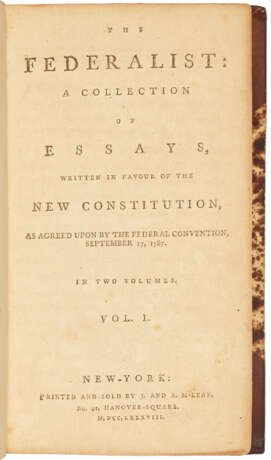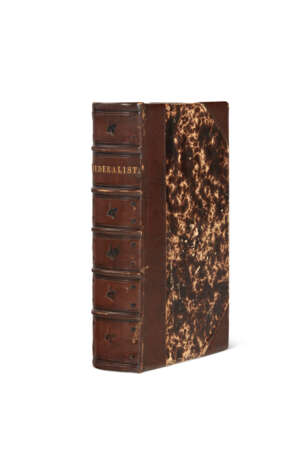ID 1032983
Lot 324 | The Federalist Papers
Estimate value
$ 80 000 – 120 000
First edition, collecting all 85 seminal essays written in defense of the newly drafted Constitution and published under the pseudonym "Publius." Together they constitute "the most thorough and brilliant explication of the Federal Constitution (or any other constitution) ever written" (Page Smith, The Constitution: A Documentary and Narrative History, pp. 263-264). "One of the new nation's most important contributions to the theory of government" (Printing and the Mind of Man). C.G. Littell copy.
Included here is the complete text of the Constitution, headed "Articles of the New Constitution," with the accompanying resolutions of the Constitutional Convention (vol. 2, pp. [367]-384). Essays 78 to 85 were printed first in this volume and then published in the newspapers, timed to coincide with the New York State Convention in Albany. The remaining essays were first printed in various New York newspapers, but collected here for the first time.
The Federalist Papers is "justly recognized as a classic exposition of the principles of republican government" (R.B. Bernstein, Are We to be a Nation? The Making of the Constitution, 1987, p.242). It grew out of the heated pamphlet wars and tumultuous debate over ratification of the Constitution. Concerned that the state of New York might refuse to ratify, Hamilton enlisted John Jay and James Madison to collaborate on a series of interpretive essays supporting the new plan of government and refuting point-by-point the objections of its many detractors. "Hamilton wrote the first piece in October 1787 on a sloop returning from Albany... He finished many pieces while the printer waited in a hall for the completed copy" (R. Brookhiser, Alexander Hamilton: American, 1999, pp.68-69). Due to Jay's illness and Madison's return to Virginia, the bulk of the 85 essays, in the end, were written by Hamilton. "Despite the hurried pace at which they worked—they ground out four articles nearly every week—what began as a propaganda tract, aimed only at winning the election for delegates to New York's state ratifying convention, evolved into the classic commentary upon the American Federal system" (F. McDonald, Alexander Hamilton, p.107). Washington, the former President of the Constitutional Convention, precisely spelled out the work's importance when he wrote that The Federalist "will merit the Notice of Posterity; because in it are candidly and ably discussed the principles of freedom and the topics of government, which will always be interesting to mankind."
Church 1230; Cohen 2818; Evans 21127; Ford 17; Grolier American 100; Howes H-114 ("c"); Federal Hundred 19; PMM, 234; Sabin 23979; Streeter sale 1049. R.B. Bernstein, Are We to Be a Nation? The Making of the Constitution, (1987), p.242. R. Brookhiser, Alexander Hamilton: American (1999), pp.68-69. F. McDonald, Alexander Hamilton: A Bibliography, p. 107.
Two volumes bound in one, 12mo (160 x 98mm). (Tiny paper flaw to 2H1 affecting one letter, a few leaves lightly toned.) Modern half calf over marbled boards, spine gilt-lettered (pastedowns with some erasures and light staining, reinforced front hinge). Custom chemise and quarter morocco slipcase. Provenance: Neva and Guy Littell. Clarence Guy Littell, 1882-1958, was President of the Chicago printers, R.R. Donnelly (bookplate; Littell sale, Parke-Bernet, 4 February 1945, lot 343).
| Artist: | Alexander Hamilton (1755 - 1804) James Madison (1751 - 1836) John Jay (1745 - 1829) |
|---|---|
| Place of origin: | USA |
| Artist: | Alexander Hamilton (1755 - 1804) James Madison (1751 - 1836) John Jay (1745 - 1829) |
|---|---|
| Place of origin: | USA |
| Address of auction |
CHRISTIE'S 20 Rockefeller Plaza 10020 New York USA | ||||||||||||||
|---|---|---|---|---|---|---|---|---|---|---|---|---|---|---|---|
| Preview |
| ||||||||||||||
| Phone | +1 212 636 2000 | ||||||||||||||
| Fax | +1 212 636 4930 | ||||||||||||||
| Conditions of purchase | Conditions of purchase | ||||||||||||||
| Shipping |
Postal service Courier service pickup by yourself | ||||||||||||||
| Payment methods |
Wire Transfer | ||||||||||||||
| Business hours | Business hours
|











